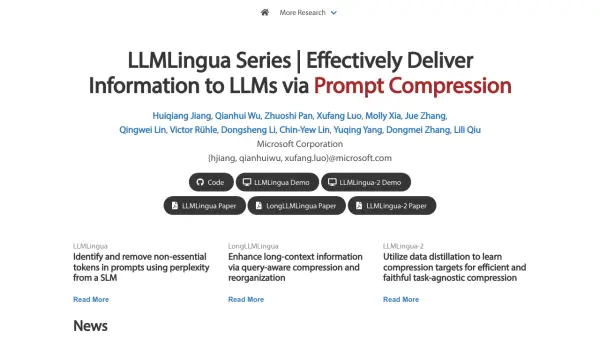What is LLMLingua Series?
The LLMLingua Series addresses challenges associated with lengthy prompts used in Large Language Models (LLMs), which are common with techniques like Chain-of-Thought (CoT), In-Context Learning (ICL), and Retrieval-Augmented Generation (RAG). Long prompts often lead to increased API latency, exceeding context window limits, potential loss of information, higher operational costs, and degraded performance issues such as the "lost in the middle" problem. LLMLingua leverages the concept that natural language can be redundant and that LLMs can understand compressed information effectively.
This series includes several approaches: LLMLingua identifies and removes non-essential tokens using perplexity calculations from a smaller language model; LongLLMLingua enhances long-context processing through query-aware compression and information reorganization; LLMLingua-2 utilizes data distillation from GPT-4 to train a BERT-level model for efficient, faithful, and task-agnostic compression. These methods aim to optimize LLM interactions by making prompts more concise without significant loss of critical information, sometimes even improving task performance.
Features
- Perplexity-Based Compression: Identifies and removes non-essential prompt tokens using a small language model (LLMLingua).
- Query-Aware Long Context Compression: Optimizes prompts for long contexts by considering the query and reorganizing information (LongLLMLingua).
- Task-Agnostic Data Distillation Compression: Employs a model trained via data distillation for efficient and faithful compression across various tasks (LLMLingua-2).
- High Compression Ratios: Achieves significant prompt size reduction (up to 20x reported) with minimal performance impact.
- Performance Enhancement: Can potentially improve downstream task performance in certain scenarios.
- Framework Integration: Compatible with popular RAG frameworks like LangChain and LlamaIndex.
Use Cases
- Accelerating LLM inference speed.
- Reducing API costs associated with LLM usage.
- Optimizing prompts for Retrieval-Augmented Generation (RAG) systems.
- Processing and summarizing long online meeting transcripts.
- Enhancing Chain-of-Thought (CoT) reasoning tasks with lengthy contexts.
- Improving code completion tasks involving extensive code prompts.
- Managing prompts that exceed LLM context window limits.
FAQs
-
What problems do long prompts cause for LLMs?
Long prompts can lead to increased API response latency, exceeded context window limits, loss of contextual information, expensive API bills, and performance issues such as the 'lost in the middle' problem. -
How does the LLMLingua Series achieve prompt compression?
It uses different methods: LLMLingua removes non-essential tokens based on perplexity, LongLLMLingua uses query-aware compression and reorganization for long contexts, and LLMLingua-2 employs data distillation to train a model for task-agnostic compression. -
Is prompt compression effective?
Yes, research indicates significant compression ratios (up to 20x) are achievable with minimal performance loss, and in some cases like with LongLLMLingua, compression can even lead to performance improvements. -
Can Large Language Models understand compressed prompts?
Yes, the underlying principle and research suggest that LLMs, including models like GPT-4, can effectively understand compressed prompts and recover the essential information needed for tasks.
Related Queries
Helpful for people in the following professions
LLMLingua Series Uptime Monitor
Average Uptime
99.72%
Average Response Time
139.27 ms
Featured Tools
Join Our Newsletter
Stay updated with the latest AI tools, news, and offers by subscribing to our weekly newsletter.









